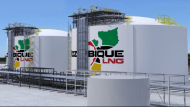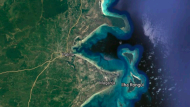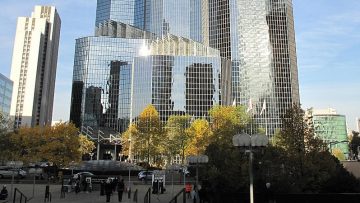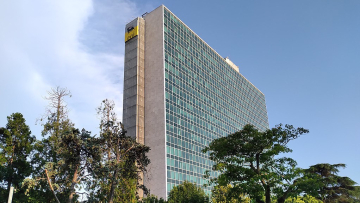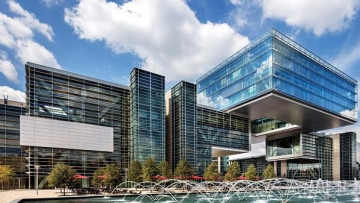Who dares to finance Eni and Exxon’s dangerous Rovuma gas plans in Mozambique?
Henrieke Butijn,
Climate campaigner & researcher,
BankTrack
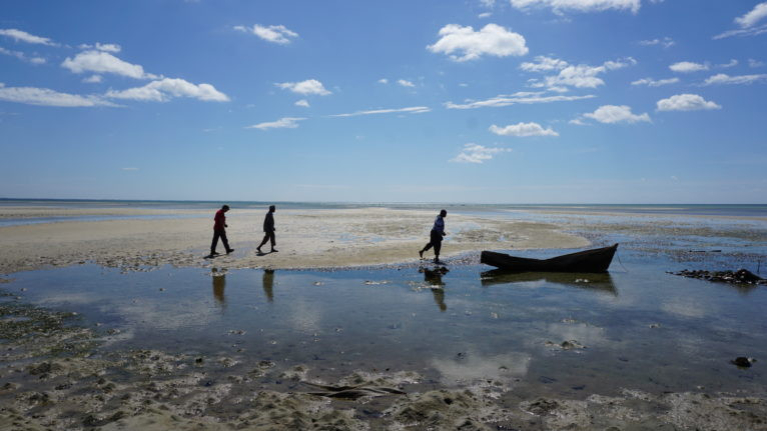
Henrieke Butijn,
Climate campaigner & researcher,
BankTrack
The success
Thanks to the collective efforts of BankTrack, Justiça Ambiental (JA!)/Friends of the Earth Mozambique, Les Amis de la Terre France and ReCommon, BNP Paribas and ING have made a clear commitment to avoid financing the Rovuma LNG project in Mozambique. UniCredit is also understood not to be financing the Rovuma LNG project, as the project is not in line with their policy on the oil & gas sector. This is a crucial step towards safeguarding local communities and the environment from the devastating impacts of gas extraction in Cabo Delgado province. However, there are still many financial institutions that have not publicly committed not to finance Rovuma LNG, and we urge them to follow suit and refrain from supporting projects that exacerbate conflicts and worsen climate change.
BankTrack's role
In partnership with the Say No to Gas in Mozambique campaign, BankTrack contacted 27 potential commercial bank financiers for the Rovuma LNG project. Through letters and a public statement, we demanded that these institutions reevaluate and cut their financial ties to the LNG projects in Mozambique and refuse to finance or provide guarantees to Rovuma LNG. The letters and the public statement were followed by a blog post exposing the potential financiers of the Rovuma LNG project. The bank decisions are a result of these joint efforts. We call on the remaining banks to follow suit.
TotalEnergies' harmful Mozambique Liquid Natural Gas (LNG) project looks like it may be restarted as soon as July this year, according to recent news reports. The project, which involves extracting, liquefying and transporting gas from fields off the northern Mozambican coastline, was put on hold in 2021 when insurgents attacked coastal towns near the construction sites.
The violence also paused another gas development, Rovuma LNG, the largest project of its kind in Mozambique. Rovuma is the only LNG project in Mozambique that has yet to reach a final investment decision and that is still looking for finance. Located in Mozambique’s northern Cabo Delgado province, Rovuma is intricately linked with the Mozambique LNG project. If the Mozambique LNG starts up again, Rovuma will soon follow, risking exacerbating an already terrible situation of conflict and violence and worsening climate change.
TotalEnergies’ largest building contractor, Saipem from Italy, is proceeding with construction because TotalEnergies has given assurances that it will be safe to restart the project by July. Saipem’s CEO admitted that the company doesn’t have any information about the human rights and security situation in the province, but apparently that is no obstacle for the construction. TotalEnergies hired a humanitarian expert to assess the situation on the ground, but already publicly committed to resuming construction despite not yet having received their report.
Developing gas in the midst of conflict
It should have been clear from the start that gas extraction in Cabo Delgado would be risky. Tensions in the area were brewing years before construction began. Insurgent attacks have been on the rise since October 2017, fueled in part by outrage over the uneven distribution of gas revenue. Local people see gas as a huge contributor to the radicalisation of the region, alleging that the projects worsen inequality and cause widespread anger, fuelling the rise of insurgent militant groups.
While TotalEnergies seems confident that it can create a safe environment to start construction again in July, the reality doesn’t seem so clear-cut. Nearly a million refugees have fled the area, and the people who remain live under constant militarisation. To create an image of stability for investors, Mozambican authorities are encouraging displaced people to return to their homes, and TotalEnergies is reportedly supporting these efforts. However, some of the returnees have been attacked by insurgents. Such is the level of TotalEnergies’ involvement in the region that Observatório do Meio Rural, a Mozambican non-profit research organisation, describes it as a 'post-colonial version of the Niassa company'.
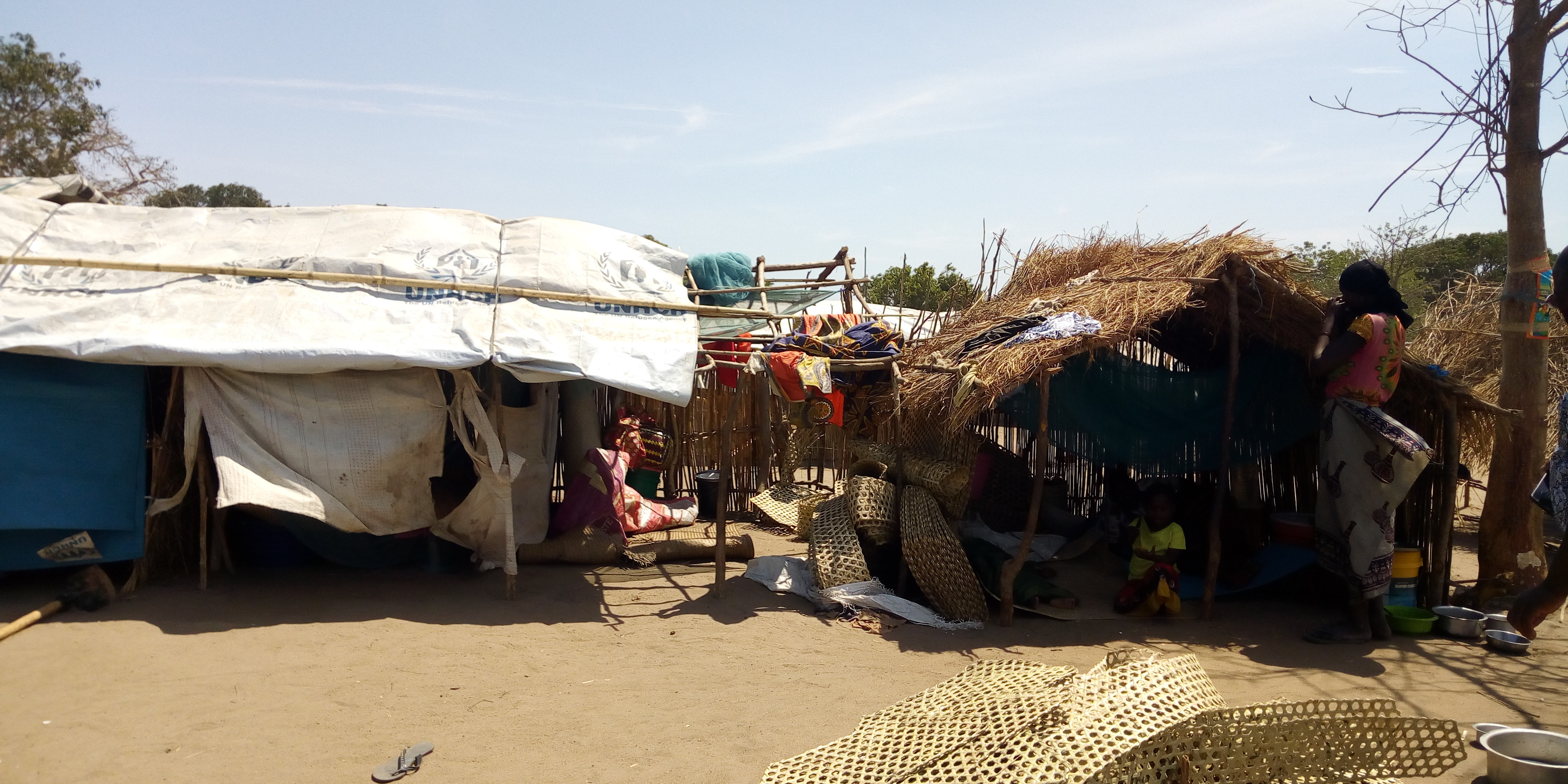
The Rwandan army (at the request of the Mozambican government and partly funded by the European Union), the army of the Southern African Development Community (SADC), and the Mozambican army all currently occupy Cabo Delgado. Local communities live alongside an indefinite military presence, as there is no public end date to both countries’ operation. Rwandan president Paul Kagame recently revealed that the country will deploy its own private security forces in Mozambique.
While all of these parties are trying to secure the Cabo Delgado region and LNG sites, the fight against insurgents in the Afungi peninsula is actually pushing combatants to other areas, like the Montepuez district where the number of attacks have already increased. The offensive by the Rwandan and other armies has also resulted in a shift of tactics from the insurgents, from the previously high-profile attacks and land-grabbing strategy to breaking up into smaller cells, performing hit-and-run attacks in a larger area, and raiding villages and security posts. These reports challenge the idea that the required stability to develop LNG activity in a non-militarized area can be brought in the short-medium term.
In addition, despite efforts to provide food, transportation and basic services, and attempts to stimulate local economic activity, the risk of a famine remains high. Famine, along with unemployment and a lack of education facilities, which have been identified as causes of the growth of the insurgency, could extend the conflict if not tackled properly.
Rovuma LNG: exacerbating an already terrible situation
The Rovuma LNG project aims to liquefy and market 15.2 million tonnes of fossil gas per year, mostly for export. The project is owned by the Italian petroleum giant Eni, alongside ExxonMobil, China National Petroleum Corporation, and several smaller shareholders. Commitments to buy the gas were signed with affiliated buyer entities from Eni, Exxon and the other partners. Rovuma includes both offshore and onshore facilities, which it shares with TotalEnergies’ Mozambique LNG project.
Coupled with the Mozambique gas project and a nearby LNG terminal called Coral South FLNG, Rovuma has the potential to increase Mozambique’s emissions by 14%. The burning of gas from the Mozambique LNG project alone would result in emissions of some 116 million tonnes of CO2 equivalent per year, as much as the EU’s entire aviation sector.
These same emissions will exacerbate the climate change impacts from which Mozambique is already suffering. Changing weather patterns are causing extreme events like severe storms and droughts across the country. In 2019, Cyclone Idai and Cyclone Kenneth killed at least 1,500 people in Mozambique, Zimbabwe and Malawi and caused over US$ 3 billion in damage. Hundreds of thousands were displaced, and many died of cholera and other illnesses. Cyclone Freddy, a storm that has been terrorising Malawi and Mozambique for the last 35 days, has already killed at least 200 people and injured many.
Pushing ahead with these projects means that Mozambique will be left with stranded assets and locked into fossil fuel dependency for decades to come. This will deny the country the chance for a Just Transition to renewable energy that could benefit the local population rather than aggravating the problem.
Aside from worsening climate change, these projects also have direct impacts on local communities. Mozambique LNG has already contributed to myriad human rights issues, and Rovuma is dependent on the same infrastructure. Some of the onshore facilities shared by the two projects caused the forced displacement of over 550 local families. Several organisations have expressed concerns about government violence against journalists and activists, noting the arbitrary detention and forced disappearance of several local reporters who criticised the gas developments.
As violence broke out across the region in March 2021, Total declared force majeure on Mozambique LNG and told its employees to leave the country. Eni put Rovuma on hold as well, but then pitched the idea of a floating natural gas processing facility to “circumvent political risks”. One of Eni’s chief officers said the offshore plant design offers “a tremendous opportunity window” to get Rovuma back on track. As Total resumes construction on the Mozambique LNG, Rovuma’s developers will look for ways to restart their project as well.
But to get back to business, Rovuma needs money.
Who will finance Rovuma LNG?
Bank financing is an important factor for the Rovuma project to move ahead. So far, Rovuma only has two known supporters: the United States government’s International Development Finance Corporation, which promised US$ 1.5 billion in risk insurance; and French bank Crédit Agricole, which serves as the financial advisor on the project.
Our organisations contacted 27 potential commercial bank financiers for the project, identified based on their previous support for either Coral South FLNG or Mozambique LNG, or their financial ties to Eni or ExxonMobil. We sent letters and released a public statement, demanding that the institutions reassess and cut their financial ties to the LNG projects in Mozambique that have already been financed, and that they refuse to finance or provide guarantees to Rovuma LNG.
Following the letter and the statement, Eni’s two largest financiers, BNP Paribas and UniCredit, both ruled out supporting the Rovuma LNG project. This is an important signal, not only to Eni but also to the other institutions that are considering whether to finance Rovuma.
However, if the banks continue to finance the companies that run these projects, they could still be supporting the plants’ development. Any general corporate finance to these companies could potentially be used for the equity part of the project.
None of the remaining 25 banks have publicly responded to the letter or public statement. Two banks privately assured us that they will not finance Rovuma, but they have not announced their commitments publicly.
Some banks cite client confidentiality to dodge questions about whether they will support Rovuma. This “inability” to answer questions about specific customers is a choice. Instead of citing confidentiality, banks could choose to seek client permission to disclose the financing relationship, either in response to queries like this, or better, systematically as part of client onboarding.
Among the banks who have not publicly responded to our call, many have policies that have the potential to exclude financing for projects like Rovuma.
For instance:
-
Absa Group’s Oil and Gas Financing Standard rules out financing “the development, extraction, or any associated activity where human resettlement is not appropriately managed.”
-
ABN Amro states in its Oil and Gas Policy that “the bank takes a very cautious approach to financing upstream oil and gas activities in fragile states, and in conflict-affected and high-risk areas.”
-
ING’s Oil and Gas Policy prohibits the financing of new upstream oil and gas fields, like the Mamba gas field that will feed the Rovuma LNG plant, and midstream (oil & gas infrastructure) activities that unlock new oil and gas fields.
-
HSBC’s Energy Policy states that the bank will not provide financing or advice to any project “pertaining to new oil and gas fields where the final investment decision was taken after 31 December 2021, or infrastructure whose primary use is in conjunction with new oil and gas fields." In addition, HSBC excludes ultra-deep water oil and gas upstream and related midstream projects greater than 2000 metres below surface level. Eni estimates the Mamba field to be at a depth of about 3400 metres.
-
Intesa Sanpaolo’s Group Guidelines exclude financing for any projects or companies that damage areas classified by the International Union for the Conservation of Nature – like Quirimbas National Park, a UNESCO Biosphere Reserve in Cabo Delgado that will be threatened by the LNG project.
Of the financial institutions that have not responded to our call, 21 are signatories to the Equator Principles, which oblige banks to consider the environmental and social impacts of a project before financing it. Rovuma would fail to comply with the Equator Principles for several reasons. These include the absence of meaningful public consultation meetings for the people that were displaced for the Afungi LNG park; safety risks to community members, human rights and environmental defenders, and journalists critical of the project; and improper land valuation, acquisition and compensation processes.
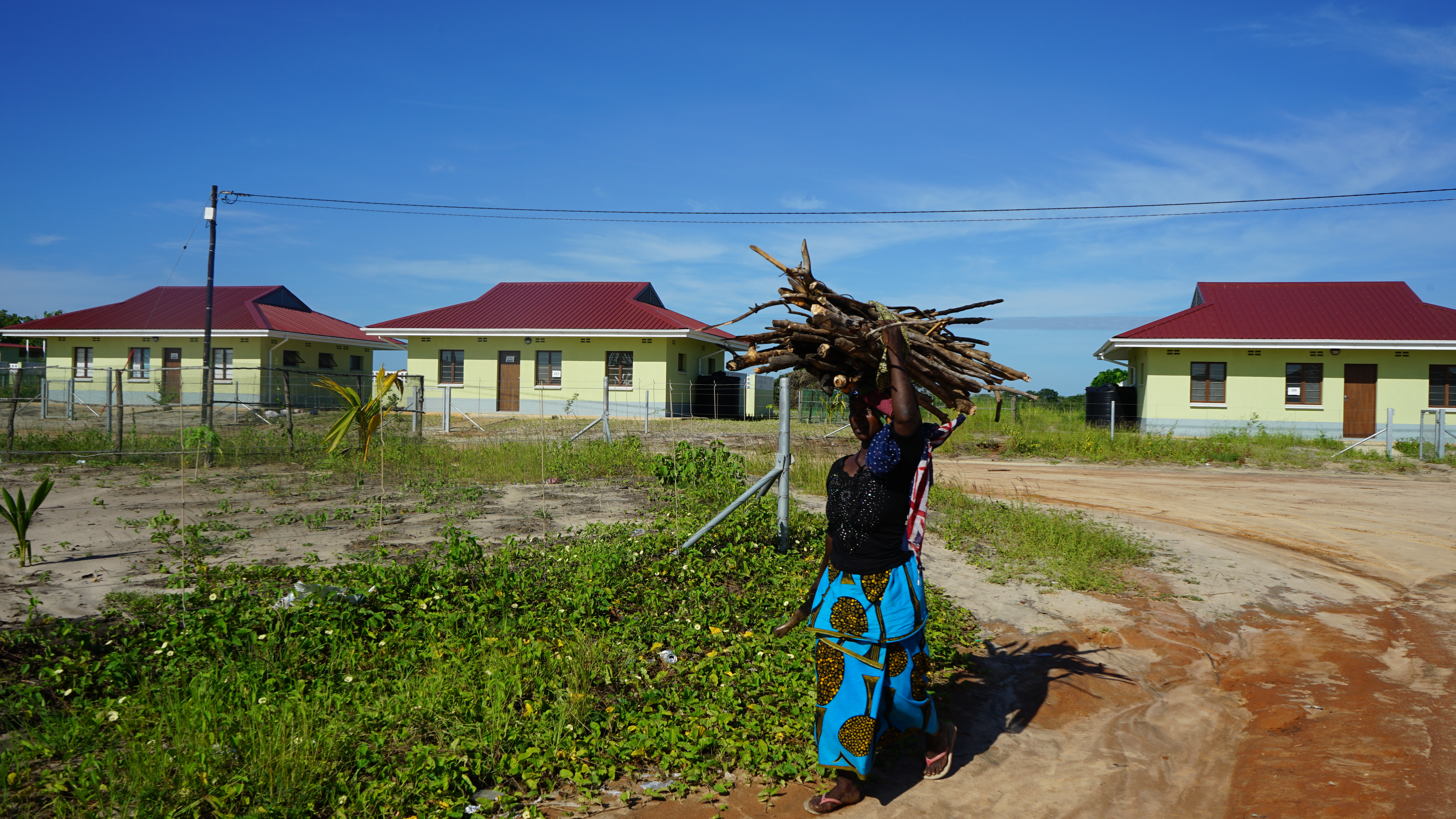
What banks must do
The security situation cannot be resolved easily, and its impacts on local communities - displacement, loss of livelihoods, and lack of compensation - are unacceptable. Continuing the Mozambique LNG project and investing into Rovuma LNG would show a reckless disregard for the grievances of communities from Cabo Delgado. There are too many unmanageable risks linked to these projects.
Therefore, banks must rule out or end any existing or future financial support for the Mozambique and Rovuma LNG projects. If they count Eni, ExxonMobil or TotalEnergies as clients, financial institutions must also put pressure on the companies to cancel the projects and should avoid financing these companies until they abandon projects that expand the fossil fuel industry.
To prevent financing projects like Rovuma LNG in the future, financial institutions also need to set better policies. One positive example is that of France’s La Banque Postale, which has an Oil & Gas Policy that excludes financing for any new projects in the entire supply chain, and excludes new finance and phases out existing finance for the more than 900 companies listed in the Global Oil and Gas Exit List.
Other banks must follow suit, instead diverting their finance to renewable energy and supporting a Just Transition that benefits local people rather than destabilising their communities.
If they continue financing these projects, banks are likely to end up exposed to stranded assets in a destructive and dying industry. Furthermore, they risk being linked to, and helping exacerbate, horrific human rights abuses, both due to the insurgency and from the public and private armies assigned to end it.
These banks have been warned. Now they must make the right choice.
More information can be found on the website of the Say No to Gas! in Mozambique campaign and the profiles of the Mozambique LNG and Rovuma LNG projects.
Note:
The full list of the banks that were contacted and have not responded publicly is:
ABN Amro, Absa Bank, Bank of America, Bank of China, Barclays, Citi, Crédit Agricole, Deutsche Bank, FirstRand/Rand Merchant Bank, Goldman Sachs, Groupe BPCE/Natixis, HSBC, ING, Intesa Sanpaolo, Millennium BCP, Mizuho, Morgan Stanley, MUFG, Nedbank, Shinsei Bank, SMBC, Société Générale, Standard Bank, Standard Chartered, Wells Fargo.

